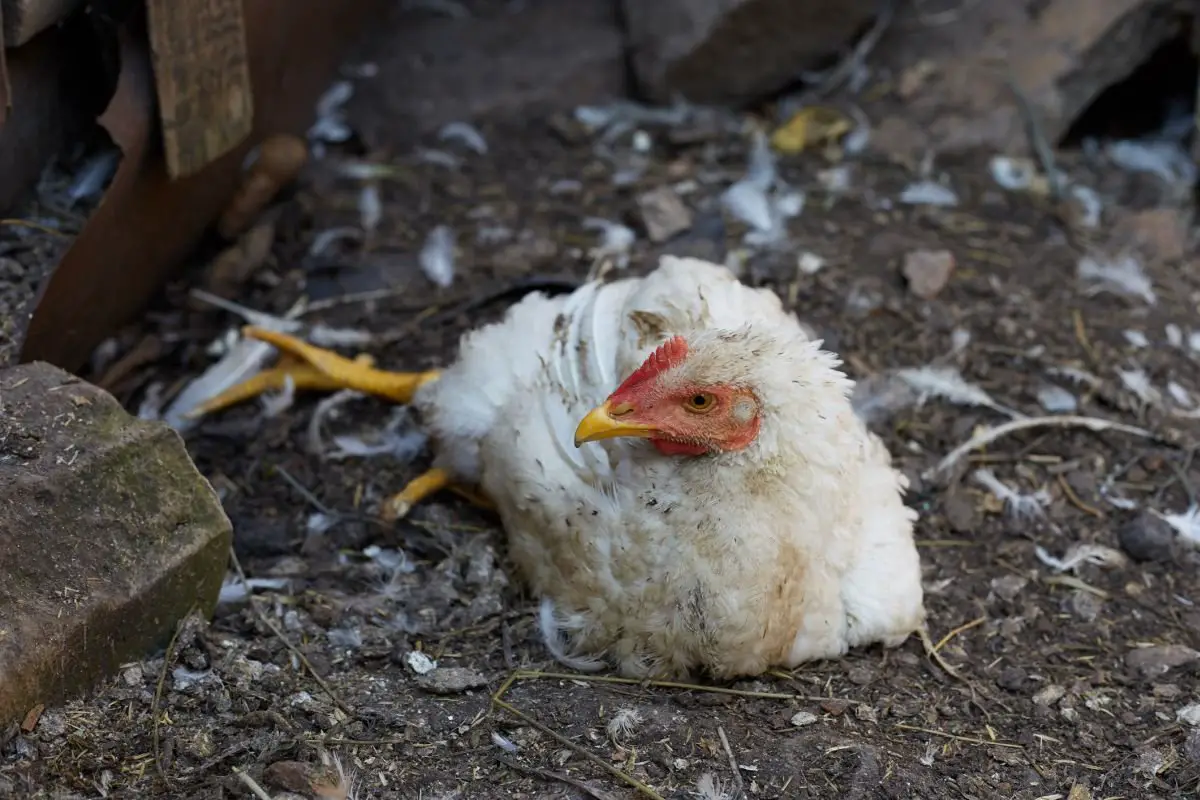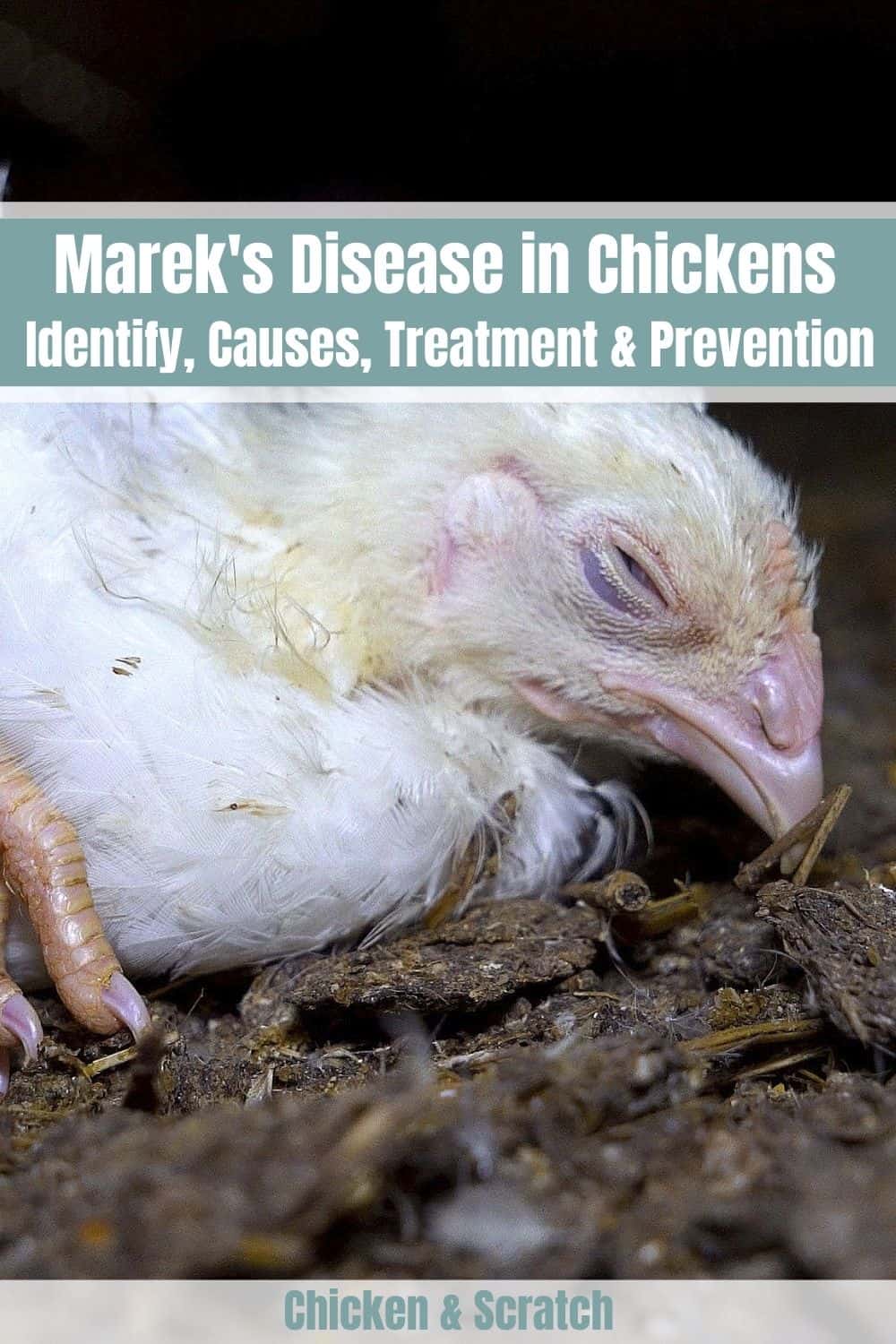Marek’S Disease in Chickens: Symptoms, Prevention, And Treatment

Marek’s Disease is a serious viral disease that affects chickens. The disease is caused by a herpesvirus and can cause tumors, paralysis, and death in chickens. Symptoms of Marek’s Disease include: lethargy, loss of appetite, diarrhea, respiratory distress, neurological signs such as tremors and seizures, and white or yellowish tumors on the skin.
Marek’s Disease can be prevented with vaccinations, but there is no cure once a chicken has been infected. Treatment focuses on relieving symptoms and supporting the bird through its illness.
Marek’s disease is one of the most serious poultry diseases and can be deadly to chickens. The good news is that it is preventable and treatable if caught early. Symptoms of Marek’s disease include paralysis, respiratory problems, and tumors.
Mareks Disease is caused by a virus and spread through contact with infected birds or their feathers, feces, or dust. The best way to prevent Marek’s Disease is to vaccinate your chickens against it. If you think your chicken may have Marek’s Disease, contact your veterinarian immediately for treatment options.
Marek's Disease in Poultry| How To treat Marek's Disease
How to Treat Marek’S Disease in Chickens
If your chicken has Marek’s disease, also known as avian leucosis, there are some things you can do to treat it. The first step is to isolate the affected chicken from the rest of the flock. This will help to prevent the spread of the disease.
Next, you’ll need to consult a veterinarian for treatment options. There are antiviral medications that can be used to treat Marek’s disease, but they must be prescribed by a vet. In some cases, surgery may be necessary to remove tumors caused by the disease.
Marek’s disease is a serious condition that can be fatal in chickens. However, with prompt treatment, many chickens recover and go on to live normal, healthy lives.
How to Prevent Marek’S Disease in Chickens
Marek’s disease is a chicken virus that can cause paralysis and death in birds. The good news is that there are some things you can do to help prevent your chickens from getting this disease.
One of the best ways to prevent Marek’s disease is to purchase vaccinated chicks from a reputable hatchery.
You can also ask your vet to vaccinate your flock if they are not already vaccinated.
It’s important to keep your chickens healthy and stress-free as this can make them more susceptible to the virus. Keep their coop clean and provide them with plenty of fresh food and water.
Avoid overcrowding and make sure they have enough space to move around comfortably.
You should also isolate any new birds before adding them to your flock. This will help ensure that they are not carrying the virus.
If you do notice any sick birds, be sure to remove them from the flock immediately and consult a vet.
By taking these precautions, you can help reduce the risk of Marek’s disease in your flock.
Natural Remedies for Marek’S Disease
Marek’s disease is a viral cancer that affects chickens. The disease is named after Dr. Josef Marek, who first described it in 1907. It is caused by a herpesvirus called the Marek’s Disease Virus (MDV).
Infection with MDV leads to the development of tumors in various organs, including the skin, nerves, and internal organs such as the liver and spleen.
There is no cure for Marek’s disease, but there are several natural remedies that can help to control it. These include using herbs such as echinacea and goldenseal, as well as vitamins A and E. You can also make a natural anti-viral spray by mixing 1 part water with 2 parts vinegar and spraying it on your chicken coop.
This will help to keep the virus from spreading.
If you have chickens that are infected with Marek’s disease, it is important to isolate them from healthy birds to prevent the spread of the virus. You should also consult with a veterinarian about the best course of treatment for your birds.
Marek’S Disease in Poultry Pdf
Marek’s disease is a serious viral infection that affects chickens and other poultry. The disease is named after Dr. Jan Marek, who first described it in the early 1900s. It is also known as fowl pox or chicken cancer.
Marek’s disease is caused by a herpesvirus called MDV-1 (also known as HVT). This virus infects cells in the lymph nodes, skin, and nervous system of chickens. The virus can cause tumors to form in these tissues.
Marek’s disease is usually fatal in young chickens, but older birds may recover from the infection.
There are two types of Marek’s disease: classical and non-classical. Classical Marek’s disease affects young chickens between 4 and 16 weeks old.
The virus causes paralysis and death within 2-3 weeks of infection. Non-classical Marek’s disease typically affects older chickens (>16 weeks old) and causes less severe symptoms such as feather loss or limb weakness. Chickens with non-classical Marek’s disease can recover from the infection and do not usually die from the disease.
Marek’s disease is spread through contact with infected feathers, body fluids, or contaminated surfaces (such as cages or equipment). The virus can also be spread through direct contact between birds (such as when two birds fight). Once a chicken is infected with MDV-1, the virus can remain latent (hidden) in the bird for its lifetime without causing any symptoms.
However, under certain conditions (such as stress), the virus may reactivate and cause clinical signs of Marek’s disease.
There is no cure for Marek’s disease, but vaccination can help prevent outbreaks of the illness in commercial poultry flocks. Vaccination programs typically involve injecting all baby chicks with a safe form of the MDV-1 virus at 1 day old; this “inactivated” form of the virus does not cause illness but helps stimulate immunity against MDV-1 .

Credit: cs-tf.com
How Do You Prevent Mareks Disease in Chickens?
Marek’s disease is a viral cancer that affects chickens. The virus can cause tumors on the skin, nerves, and internal organs of infected birds. There is no cure for Marek’s disease, and it is fatal to chickens.
However, there are steps that chicken owners can take to prevent their birds from contracting the virus.
The best way to prevent Marek’s disease is to vaccinate your chickens against it. There are two types of vaccines available: live attenuated vaccines and inactivated vaccines.
Live attenuated vaccines contain a weakened form of the Marek’s virus, which helps the chicken build up immunity to the disease without getting sick. Inactivated vaccines contain dead viruses, which cannot infect the chicken but still stimulate its immune system to create antibodies against Marek’s disease. Vaccinating your flock is the best way to protect them from this deadly virus.
Another way to prevent Marek’s disease is to keep your flock healthy and free from stressors. Chickens that are stressed or have weak immune systems are more susceptible to contracting diseases like Marek’s. Keep your coop clean and dry, provide plenty of fresh food and water, and give your birds plenty of space to exercise and socialize.
A healthy flock is a happy flock!
What are the Symptoms of Marek’S Disease in Chickens?
Marek’s disease is a viral disease that affects chickens. The symptoms of Marek’s disease include: paralysis, weakness, seizures, and death. Chickens infected with Marek’s disease may appear healthy for weeks or months before showing any signs of illness.
The virus can affect any age chicken, but young birds are more susceptible. There is no cure for Marek’s disease and it is fatal in most cases. Vaccination is the best way to prevent Marek’s disease.
Can a Bird Recover from Marek’S Disease?
Marek’s disease is a serious viral infection that affects chickens and other poultry. The disease is named after Dr. József Marek, who first described it in 1908. Marek’s disease is caused by a herpesvirus known as the Marek’s Disease Virus (MDV).
This virus is closely related to the viruses that cause chickenpox and shingles in humans. Chickens can become infected with MDV through contact with contaminated feathers, dust or bedding. The virus can also be spread through contact with infected wild birds.
Infected chickens usually show no symptoms of illness for several weeks or months. However, the virus continues to multiply inside their bodies during this time and eventually causes cancerous tumors to form in their internal organs, including the liver, kidney and spleen. Marek’s disease is almost always fatal in affected chickens.
There is no known cure for the disease and there are no effective vaccines available to prevent it from spreading.
What Are the Symptoms of Marek’s Disease in Chickens?
Marek’s Disease is a highly contagious viral disease affecting chickens. It causes various symptoms such as paralysis, weight loss, paralysis of wings or legs, and tumors in internal organs. To learn more about the symptoms, causes, and prevention of Marek’s Disease, refer to a definitive guide on marek’s disease.
What Disinfectant Kills Marek’S?
Marek’s Disease is a poultry virus that can be fatal to chickens. There are several commercial disinfectants that will kill the virus, but not all of them are effective against all strains of the virus. The best way to ensure that your chicken coop is free of Marek’s disease is to practice good biosecurity measures, such as quarantine of new birds, and regular cleaning and disinfection of the coop.
Conclusion
Marek’s disease is a viral infection that affects chickens and other poultry. The disease is named after Dr. József Marek, who first described it in 1908. Marek’s disease is caused by a herpesvirus called MDV-1 ( Marek’s Disease Virus-1).
This virus infects the nervous system and can cause paralysis, blindness, and even death in young chickens. The good news is that there are vaccines available to prevent Marek’s disease. Treatment for infected chickens is typically supportive care to help them through the illness.